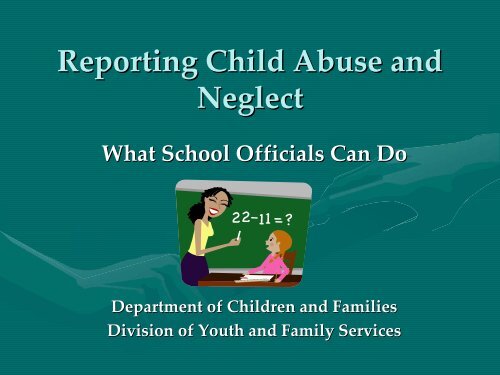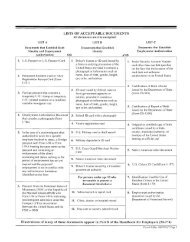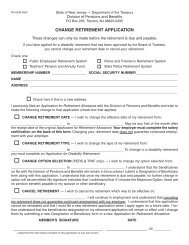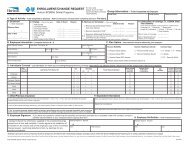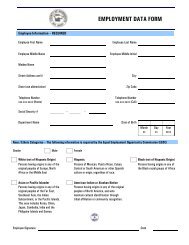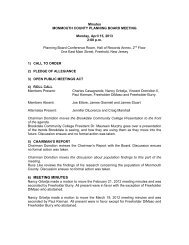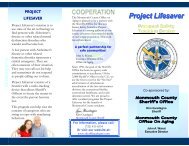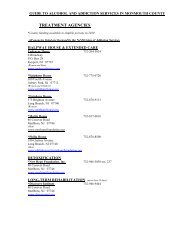DYFS - Monmouth County
DYFS - Monmouth County
DYFS - Monmouth County
You also want an ePaper? Increase the reach of your titles
YUMPU automatically turns print PDFs into web optimized ePapers that Google loves.
Reporting Child Abuse and<br />
Neglect<br />
What School Officials Can Do<br />
Department of Children and Families<br />
Division of Youth and Family Services
Facts:<br />
• Each year, more than three million cases of child abuse<br />
and neglect are reported to authorities in the United<br />
States*<br />
• As many as four children die each day from abuse*<br />
• About one‐third of abused children later abuse their own<br />
children*<br />
• Schools are the largest reporters of child abuse to <strong>DYFS</strong>.<br />
* Source: Child Welfare Information Gateway
Reports to Child Abuse/Neglect Hotline<br />
• In 2006, 65,834 referrals were received by the<br />
hotline, which included:<br />
• 53,819 Child Protection Referrals<br />
(child abuse and neglect)<br />
• 12,015 Family Services Requests<br />
• Historically, about 20% of investigated child<br />
abuse/neglect referrals are substantiated each<br />
year.
Division of Youth and Family Services<br />
Referral Sources for All Reports and Requests<br />
CY 2006<br />
Total = 65,834<br />
Facility<br />
2%<br />
Legal &<br />
Court<br />
1%<br />
<strong>DYFS</strong><br />
6%<br />
Police<br />
12%<br />
Parent<br />
10%<br />
Relative<br />
5%<br />
Health<br />
12%<br />
School<br />
22%<br />
Other Gov't<br />
Agency<br />
7%<br />
Prepared March, 2007<br />
Friend/Neighbor/<br />
Community<br />
7%<br />
Anonymous<br />
15% Self<br />
1%
Department of Children and Families<br />
• This new cabinet‐level department was created in<br />
July 2006 by Governor Corzine.<br />
• Consists of several offices and divisions ‐<br />
including <strong>DYFS</strong> ‐ that were formerly part of the<br />
Department of Human Services.<br />
• Focuses on child protection, child welfare,<br />
permanency, education, child behavioral health,<br />
and prevention of child abuse and neglect.
<strong>Monmouth</strong> <strong>County</strong> Statistics<br />
As of August, 2008:<br />
– 1264 total families<br />
– 2556 active children<br />
– 510 in‐home cases<br />
– 331 placement cases<br />
• 519 children in<br />
placement<br />
– 423 investigation cases
The <strong>DYFS</strong> Local Office Makeup<br />
• Intake: Investigates all allegations of abuse and<br />
neglect and conducts child welfare<br />
assessments.<br />
• Permanency: : On‐going case management to<br />
provide supervision and services to children<br />
and families.<br />
• Foster and Relative Care: : Facilitates the<br />
recruitment, development, and case<br />
management for all resource family homes.
The <strong>DYFS</strong> Local Office Makeup<br />
(cont.)<br />
• Adoption: Case management for children who<br />
may need adoptive homes.<br />
• Clerical: Provides support to field staff and<br />
crucial data entry tasks, and processes all<br />
financial payments.<br />
• Support Staff: Provides an integral part of field<br />
staff support in operations, policy, and<br />
procedures.
Healthcare Related Services<br />
• Each Local <strong>DYFS</strong> Office<br />
is staffed with a child<br />
health nurse and staff<br />
assistants from UMDNJ.<br />
• Provides direct care and<br />
information and referral<br />
links to families to help<br />
navigate the healthcare<br />
system.
The Child Protection Substance<br />
Abuse Initiative<br />
• Each <strong>DYFS</strong> Office is staffed with sub‐<br />
contracted Certified Alcohol and Drug<br />
Counselors along with other support staff<br />
to facilitate substance abuse evaluations<br />
and assessments.<br />
• Information and referral services to<br />
facilitate substance abuse treatment is also<br />
provided.
What is Child Abuse and Neglect<br />
A child who is under the age of 18 is considered to be<br />
abused or neglected when a parent or caregiver:<br />
• Inflicts or allows to be inflicted physical injury by<br />
other than accidental means that creates substantial<br />
harm or risk of substantial harm.<br />
• Fails to provide proper supervision or adequate food,<br />
clothing, shelter, education or medical care although<br />
financially able or assisted to do so.<br />
• Commits or allows to be committed an act of sexual<br />
abuse against a child.
What are the common signs of abuse<br />
unexplained bruises,<br />
• Indicators of physical abuse: unexplained bruises,<br />
welts, burns, lacerations, fractures, abrasions, etc.<br />
• Indicators of sexual abuse: complaints regarding<br />
genital/anal areas, sexually transmitted diseases,<br />
unusual knowledge about or preoccupation with sex.<br />
• Indicators of neglect: consistent hunger, poor hygiene,<br />
inappropriate dress, lack of supervision.<br />
• Indicators of emotional difficulties for which abuse<br />
may be considered may include: aggressive or<br />
withdrawn behavior, unusual fears, running away,<br />
sudden change in mood or behavior.
Parental Substance Abuse<br />
• Substance abuse alone by a parent is NOT child<br />
abuse/neglect. It may contribute to abuse/neglect.<br />
• Abuse/Neglect focus is impact on the child<br />
• Is the child being neglected or at risk of harm due to a<br />
parent’s misuse of drugs or alcohol<br />
• Is the parent allowing the child access to drugs or<br />
alcohol<br />
• Does the newborn have Fetal Alcohol Syndrome<br />
• Has the newborn infant tested positive for drugs
Educational Neglect<br />
• Failure to enroll a school age child (between age 6 and<br />
16) in school<br />
– Home‐schooling is NOT Educational Neglect<br />
• A school‐age child is enrolled but is failing to attend on a<br />
regular basis<br />
– Parent failing to take action to correct the problem<br />
– Parent is actively preventing attendance<br />
• Schools must take action first and exhaust remedies<br />
• Call if questions arise as educational neglect may be part<br />
of a larger neglect concern
What are my obligations to report<br />
child abuse/neglect<br />
By state law (N.J.S.A.9:6‐8.10<br />
and 18A:36‐25) and NJDOE<br />
regulations (N.J.A.C. 6A:16‐<br />
11.1), any person having<br />
reasonable cause to believe<br />
that a child has been abused<br />
or neglected is required to<br />
notify the Division of Youth<br />
and Family Services (<strong>DYFS</strong>).
What are my obligations to report<br />
child abuse/neglect<br />
• In compliance with NJ DOE regulations,<br />
after reporting to <strong>DYFS</strong>, any school district<br />
employee, volunteer or intern must<br />
inform the principal or other designated<br />
school official so that law enforcement<br />
authorities can be notified.
What if I suspect abuse and DO<br />
NOT report it<br />
• Knowingly not reporting abuse<br />
or neglect can have devastating<br />
consequences on a child and<br />
legal consequences on people<br />
who do not report!<br />
– Any person who knowingly fails<br />
to report suspected abuse<br />
according to the law is a<br />
disorderly person and subject to a<br />
fine up to $1,000 or up to 6<br />
months in prison, or both!
Child Abuse/Neglect Hotline<br />
(State Central Registry)<br />
Operates 24 hours a day, 7 days a week to receive<br />
reports.<br />
1‐877‐ NJ ABUSE<br />
1‐877‐652‐28732873<br />
• Reports of suspected child abuse and neglect and requests<br />
for child welfare services are screened.<br />
• All calls are recorded for quality assurance purposes.<br />
• All reports of child abuse and neglect are investigated<br />
within 24 hours, or sooner if the need exists.
Call 1‐8771<br />
NJ ABUSE if there is<br />
reasonable belief of risk to a child<br />
* Call as soon as possible:<br />
– When you see signs of abuse or neglect<br />
– When a child tells you about the abuse or neglect<br />
– When you witness abuse or neglect<br />
– When a parent/other individual tells you about abuse<br />
• Call early in the day: The investigator has time to plan<br />
the response and may be able to see the child at school.<br />
• Be supportive of the child!
How do I make a report<br />
• All reports of child abuse should be made<br />
immediately by YOU by calling 1‐8771<br />
877‐NJ ABUSE<br />
(652‐2873)<br />
2873)<br />
• Some school policies require that the person<br />
reporting the alleged abuse and/or neglect shall<br />
inform the principal that a report has been made<br />
to <strong>DYFS</strong>.<br />
• However, the principal need not be given notice<br />
if the reporter feels it may endanger the reporter<br />
or child involved.<br />
• Make sure you are familiar with your school’s<br />
policies.
YOU SHOULD KNOW…<br />
• Names of reporters of child abuse and neglect are<br />
confidential. However, in the event of court action, their<br />
identities may be revealed during litigation.<br />
• Calls can be made anonymously, but…<br />
• The investigator may need to clarify information with<br />
the reporter, or have additional questions.<br />
• School staff may be entitled to feedback, under certain<br />
circumstances (e.g., reporters can be informed whether<br />
services will be provided to the family or child<br />
involved).
Details Make a Difference – if you<br />
know<br />
• Who ‐ Identify the people involved – the child, the<br />
alleged perpetrator, the perpetrator’s relationship to the<br />
child; parents, siblings, others in the home; dates of<br />
birth, addresses<br />
• What ‐ What type of abuse/neglect is suspected<br />
Describe the incident. What happened that caused your<br />
concern What is the child’s current condition<br />
• Where ‐ Where did the incident take place Where is the<br />
child now Does the alleged perpetrator have access to<br />
the child
Details Make a Difference ‐ if you<br />
know (cont’d)<br />
• When ‐ When did the incident happen What is<br />
the frequency of the abuse/neglect When did<br />
you learn about it<br />
• How ‐ How urgent is the need for intervention<br />
Is there a likelihood of danger for the<br />
caseworker<br />
• School personnel also should let <strong>DYFS</strong> know<br />
when and how the child will be released from<br />
school to ensure the child’s safety.
Hotline Decision Options<br />
• Abuse/Neglect Report: Meets the standards of<br />
one or more defined allegations.<br />
– Immediate response<br />
– 24‐hour response<br />
• Child Welfare Assessment: Need for social<br />
services but no identified risk to the child.<br />
– Immediate response<br />
– 72‐hour response<br />
• Information and referral.<br />
• Information only.
New Jersey Child Abuse Law<br />
Title 9<br />
• Provides <strong>DYFS</strong> the authority to investigate<br />
reports of child abuse and neglect. The law<br />
states <strong>DYFS</strong> shall immediately take such action<br />
as is necessary to ensure the safety of the child.<br />
• This includes child interviews in a school setting<br />
without parental consent.
Title 9 (continued)<br />
• When <strong>DYFS</strong> receives<br />
a report of child<br />
abuse and neglect or<br />
receives a request<br />
from the superior<br />
court, <strong>DYFS</strong> may<br />
request of any and all<br />
institutions and<br />
agencies their records<br />
pertaining to that<br />
child.<br />
• <strong>DYFS</strong> may seek court<br />
orders through the<br />
superior court to<br />
investigate allegations<br />
of abuse or neglect, to<br />
gain custody of a<br />
child, or for care and<br />
supervision of a child.
Child Welfare Assessment<br />
• The report does not meet the criteria of<br />
any specific allegation of abuse or neglect.<br />
• The Child Welfare assessment may lead to<br />
the provision of services.<br />
• The acceptance of services is voluntary.<br />
• An investigator will respond within 3<br />
days of a referral.
New Jersey Child Welfare Law<br />
Title 30<br />
• When <strong>DYFS</strong> receives a report that a child and or<br />
family may be in need of <strong>DYFS</strong> services and or<br />
other social services.<br />
• Under title 30 <strong>DYFS</strong> may provide services to<br />
remedy conditions that do not rise to the level of<br />
title 9.<br />
• Title 30 services can be provided with the<br />
consent of the parent or court order requiring or<br />
authorizing services.<br />
• The title 30 law covers adoption and the<br />
severing of parental rights.
Investigation by <strong>DYFS</strong><br />
Citing consistency with a cooperative effort, State Board of<br />
Education procedures state that appropriate local school<br />
officials and employees shall:<br />
• Release to agency representatives all records past and<br />
present pertaining to the child and children under<br />
investigation.<br />
• Permit the representative to physically view the child or<br />
children in question.<br />
• Permit the representative to interview such child or<br />
children in the presence of a school official.<br />
• Permit the representative to interview any and all<br />
personnel who may have knowledge germane to the<br />
investigation.
Safety Factors<br />
• Safety factors are elements of imminent or<br />
emergent child and family situations that<br />
present an immediate need for<br />
intervention and remediation to keep a<br />
child safe. <strong>DYFS</strong> must take necessary<br />
actions to ensure the safety of the child.
Risk Factors<br />
• The chance of maltreatment. Children and<br />
families needing <strong>DYFS</strong> supervision and<br />
supportive/protective services whose<br />
needs are not of an immediate/emergent<br />
nature.<br />
• <strong>DYFS</strong> provides services and supervision<br />
to thousands of at risk children who reside<br />
in their own home each year.
Removing a Child From School<br />
• In physical abuse situations when the parent is assessed to be a<br />
threat to the physical safety of the child, or in domestic violence<br />
situations physical injury to the non abusive parent and the police<br />
are unable or unwilling to escort the caseworker to the home.<br />
• In emotional and or sex abuse situations, when confrontation<br />
between the parent and the child is likely to cause severe<br />
irreversible emotional or psychological harm.<br />
• When the strategy of removing the child from the home is likely to<br />
make the child vulnerable to the parent fleeing with the child or o<br />
holding the child hostage when law enforcement is either unable or<br />
unwilling to escort the caseworker and child into the home.<br />
• Only a <strong>DYFS</strong> representative, police officer, or probation officer can<br />
remove a child from school in accordance with the building<br />
principal. This includes authorization for not putting a child on the<br />
bus to go home.<br />
• <strong>DYFS</strong> cannot transport children to and from school without having<br />
legal custody of that child.
The Dodd Law<br />
• Empowers <strong>DYFS</strong>, the police, and probation<br />
officers to make emergency removals without<br />
parental consent and without a court order.<br />
• Based on the significance of this legislation, an<br />
emergency removal without parental consent<br />
and without a court order has become known as<br />
a ʺDodd removal.ʺ N.J.S.A. 9:6‐8.29 has become<br />
known as the ʺDodd law.ʺ
<strong>DYFS</strong> and Cases in Litigation<br />
• A lawyer called a deputy attorney general, or<br />
DAG, will represent <strong>DYFS</strong>.<br />
• The child will be represented by a lawyer called<br />
a law guardian. The law guardian will also have<br />
investigators that may want to interview the<br />
child and school personnel.<br />
• An abuse or neglect case is not a criminal case. It<br />
is a civil action.<br />
• Criminal court matters and <strong>DYFS</strong> civil court<br />
actions may run concurrently.<br />
• The police or prosecutor has responsibility for<br />
the criminal investigation.
<strong>DYFS</strong> Confidentiality<br />
To the extent that the school needs information to<br />
care, treat, or supervise the child, under N.J.S.A.<br />
9:6‐8.10a(b)(5), <strong>DYFS</strong> is permitted to disclose<br />
appropriate information necessary for the school<br />
to fulfill its obligation to the child. Information<br />
should not be disclosed simply to complete<br />
school records nor for school administrative<br />
purposes.
Sharing Information with School<br />
Personnel<br />
Additional protective service information<br />
may be released only to professional<br />
school employees:<br />
• Who will be further involved in the<br />
investigation or service plan.<br />
• Who need such information to provide care,<br />
treatment, or supervision for the child.
Confidentiality by School<br />
When information is released to<br />
professional school employees:<br />
• That information is confidential.<br />
• The information released is authorized<br />
solely for the child’s care, treatment, or<br />
supervision.<br />
• The professional school employee has a<br />
responsibility to maintain<br />
confidentiality of the information <strong>DYFS</strong><br />
releases to them.
Types of Services<br />
Four major categories:<br />
• Advocacy<br />
• Counseling and Therapy<br />
• Education<br />
• Monitoring/Case Management
The <strong>DYFS</strong> Special Response<br />
Unit (SPRU)<br />
• The <strong>DYFS</strong> after‐hours emergency response unit.<br />
Special service caseworkers provide emergency<br />
intervention on nights, weekends, and holidays<br />
to protect children, minimize elements of<br />
immediate risk, and conduct child abuse<br />
investigations.
What if I am not sure if a child has been<br />
abused<br />
• Err on the side of caution! Call the Hotline and they<br />
will help determine if the situation is considered child<br />
abuse or neglect.<br />
• By law (N.J.S.A.9:6‐8.13), NJ residents are protected<br />
from civil or criminal liability, discharge from<br />
employment, and discrimination if they make a report<br />
“in good faith.”
What about allegations involving<br />
school personnel<br />
• The DCF Institutional Abuse Investigation Unit<br />
(IAIU) investigates allegations of child abuse<br />
and neglect in institutions and other out‐of<br />
of‐<br />
home settings that serve children: day care<br />
centers, foster homes, and schools.<br />
• School districts also may conduct an<br />
investigation, but must not interfere with an<br />
IAIU investigation.
What about children with behavioral<br />
problems<br />
• DCF’s Division of Child Behavioral Health<br />
Services will assist families with children<br />
who have behavioral or emotional health<br />
challenges.<br />
• DCF Child Behavioral Health Services<br />
Access Line (1‐877‐652‐7624)
In closing…<br />
• When considering alleged<br />
child abuse or neglect,<br />
remember to do what is in the<br />
best interest of the child.<br />
• Additional information and<br />
questions can always be<br />
directed to <strong>DYFS</strong>.
Contact Us<br />
Division’s Action Line<br />
800‐339<br />
339‐<strong>DYFS</strong> (3937)<br />
For Literature<br />
609‐292<br />
292‐6448
<strong>DYFS</strong> Liaisons<br />
<strong>Monmouth</strong> North Local Office<br />
Noelle Defranza (732) 933‐1077, ext. 151<br />
<strong>Monmouth</strong> South Local Office<br />
Sarah Jankowski (732) 988‐2161, ext. 249<br />
<strong>Monmouth</strong> Area Office<br />
Karen Asay (732) 229‐2518, 2518, ext. 2102
Remember…


